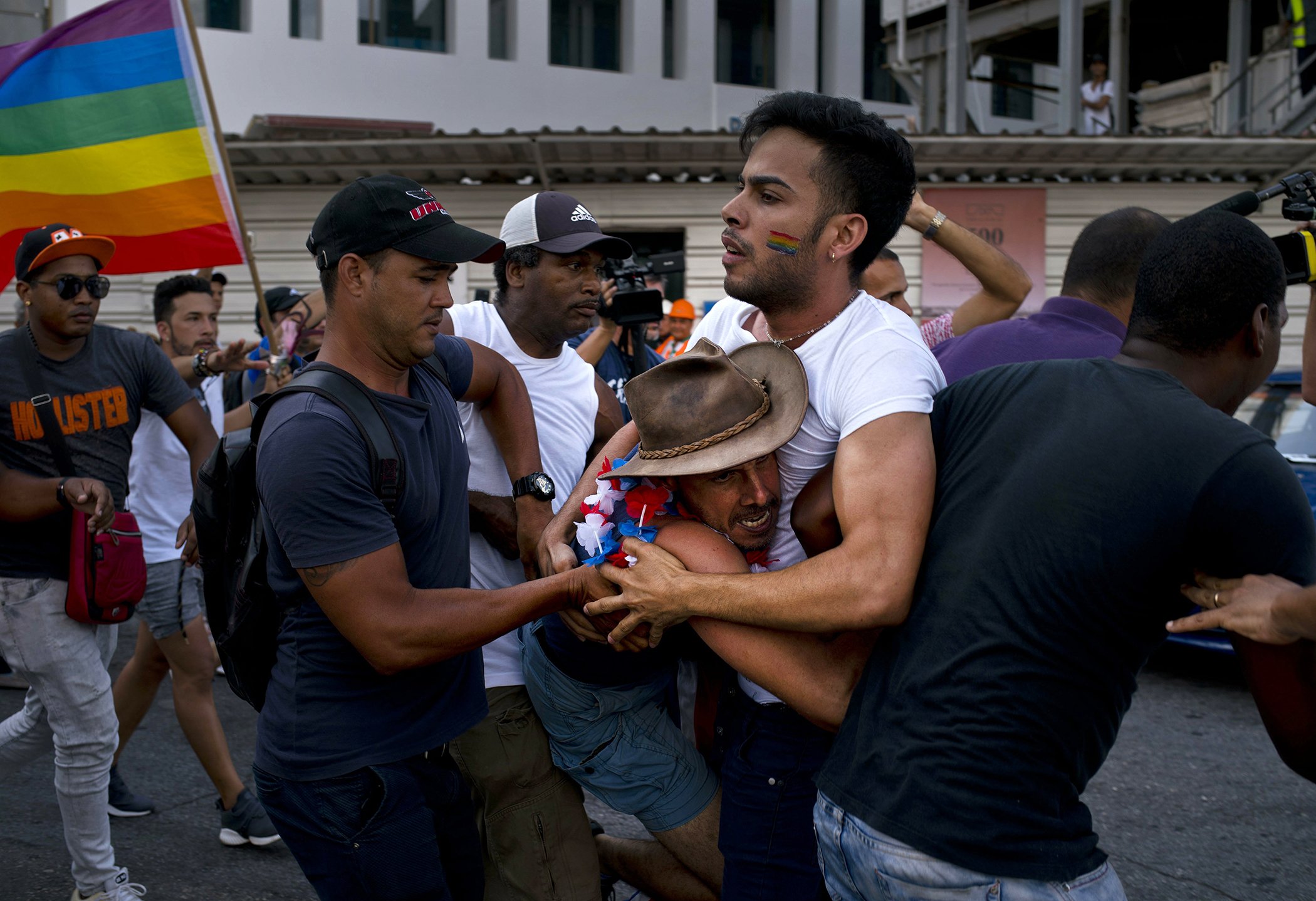For the past 11 years, the Cuban government has organized an annual march against homophobia in Havana, but a week before this year’s event rolled around, the national Center for Sex Education (CENESEX) abruptly canceled it.
The decision seemed to be a part of a broader rollback of LGBTQ rights throughout the country, so local activists decided to take matters into their own hands by staging their own Pride march on May 12.
Dozens of people showed up to march, wave rainbow flags, and convey solidarity in the streets of the capital city. Soon enough, however, plainclothes police officers began dispersing people and ultimately arrested three participants, according to the New York Times.
The Cuban government is notoriously opposed to spontaneous demonstrations in the streets and is stingy when it comes to giving out permits for public events. As a result, the crackdown may reflect a general opposition to unsanctioned public events, rather than specific LGBTQ discrimination.
“It was the act of disobedience — so seldom seen in this repressive state — that renders Saturday’s march historic and worthy of a shout out,” Fabiola Santiago wrote in an op-ed for the Miami Herald.
But as Santiago argues, the crackdown has broader resonance. In recent years, LGBTQ activists have felt growing resistance to their fight for equality.
 Cuban police detain gay rights activists taking part in an unauthorized march in Havana, Cuba, Saturday, May 11, 2019.
Cuban police detain gay rights activists taking part in an unauthorized march in Havana, Cuba, Saturday, May 11, 2019.
Cuban police detain gay rights activists taking part in an unauthorized march in Havana, Cuba, Saturday, May 11, 2019.
Read More: LGBTQ Groups Banned From Organizing Around the World: Report
Here are four things to know about LGBTQ rights in Cuba.
1. Cuba has a dark history with LGBTQ rights
After the Cuban Revolution in the 1960s, LGBTQ people were rounded up and imprisoned by Fidel Castro’s government. This went on until 1979, when homosexuality was decriminalized, but LGBTQ people continued to face widespread discrimination.
Throughout the 1980s, people with HIV were quarantined in sanitariums that some described as prisons, the Independent reports. In recent years, violence and discrimination against LGBTQ people has tapered, but it still continues.
Bigotry against the LGBTQ community is widespread around the world, which means Cuba’s record is not unique. Today, many countries still ban same-sex acts, with some governments even threatening LGBTQ people with the death penalty.
Read More: These 6 Countries Execute People for Being Gay
2. Cuba has made progress in recent years
Cuba has largely ended its state-sanctioned oppression of LGBTQ people, and has made notable progress toward equal rights.
The government made it illegal to discriminate against LGBTQ people in 2010, and announced that gender confirmation surgeries would be made free under the country’s universal health care program in 2008, according to the Independent.
Read More: Indonesia's Persecution of LGBTQ People Is Fueling an HIV Epidemic
These advances put Cuba way ahead of the global norm, where equal rights for LGBTQ people are rarely enshrined in the law.
Many LGBTQ people in Havana report that they feel safe to go out in public and various gay night clubs have popped up in recent years, but harassment and government surveillance continue. Some advocates argue that the government’s push toward greater rights has merely been a public relations campaign and lacks integrity.
For example, the government doesn’t recognize Pride Week and had only allowed one state-controlled march to take place each year.
3. A backlash is brewing
In recent years, the Cuban government attempted to legalize same-sex marriage, but that effort was thwarted by the country’s growing Evangelical movement, the New York Times reports.
Although violence and open discrimination against LGBTQ people is less common in Cuba than in other countries, social stigmas prevail, especially outside of the capital.
Read More: LGBTQ Refugees Face Unimaginable Trauma, But They’re Rising Up
Globally, LGBTQ rights have progresed in a staggered fashion, with astonishing levels of hostility found in various countries around the world, but the general trend is toward greater inclusivity and openness.
4. The Internet is making it easier to organize
The Pride march on May 12 was made possible by the internet, which has opened up an unprecedented space for organizing dissent.
As the government eased restrictions on the internet in recent years, activists have used social media channels to advocate for broader political changes.
In the aftermath of CENESEX canceling the march, LGBTQ activists quickly convened on social media and messaging platforms like WhatsApp to organize a counter event, even though they faced a potential crackdown.
Cuba gay rights activists arrested at pride march in Havana https://t.co/pAvbwGSfBl
— BBC News (World) (@BBCWorld) May 12, 2019
Read More: As Egypt Continues Its LGBTQ Crackdown, Activists Say Media Can Help
The ensuing international media coverage gave their cause far more attention than it would have otherwise received, and could help to move the needle toward greater reforms.